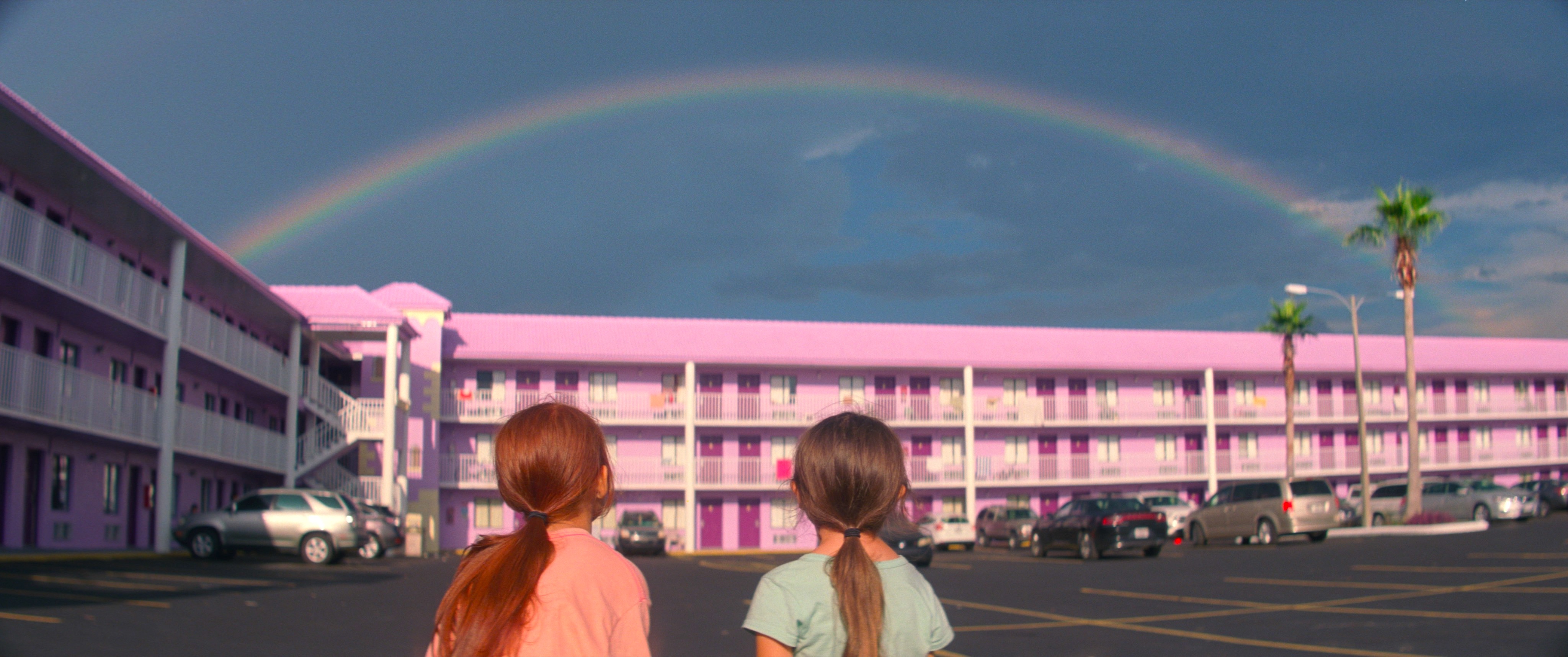
MPAA Rating: R | Rating: ★★★★
Release year: 2017
Genre: Drama Director: Sean Baker
I have never been to Disneyland, but I have been to Disney World. Growing up just south of Seattle, one might think the opposite would be true, but my parents must have found a deal of some sort to prompt our holiday to the opposite corner of the continental United States. Beyond an Indiana Jones stunt show, I can recall little from the resort itself, but I do remember the heat and humidity. The air felt like breathing through a wet sponge. Bright sunlight forced me to squint. Indeed, I was more aware of the world around me–I could literally feel the world of Florida.
The Florida Project invites us to sense and experience–to truly feel–a small corner of human existence located in the shadow of Disney World. A sympathetic character study akin to filmmaker Sean Baker’s previous film, Tangerine, The Florida Project feels like an episode of The Little Rascals by way of the Dardennes in its handheld humanism and empathetic glimpse into urban poverty. Unlike the Dardennes, there’s little in the way of a plot or an inciting ethical conundrum; this is more like home movies for characters who could never afford a camera, snapshots of everyday existence in its tragic freedom. We are invited to enter into this world and experience alongside the characters, to feel what they feel, see what they see.
The film frames its perspective almost entirely from a child’s point of view as it follows Moonee (Brooklynn Prince), Scooty (Christopher Rivera), and Jancey (Valeria Cotto) on their various escapades in and around the Magic Castle Inn. A bright lavender building with stucco walls and rows of exterior doors leading into pockets of poverty, this run-down motel lives up to its name for the children–it’s a magical world of wonder and mischief. Moonee’s unemployed mother, Halley (Bria Vinaite), lounges around in pajamas, unless she’s partying with Scooty’s mom, Ashley (Mela Murder). Moonee and her pals are mostly unsupervised, six-year-olds raising themselves and wandering around their neighborhood with childlike abandon. Baker’s camera captures the authenticity of childhood in ways I’ve rarely seen in cinema; innocence, wonder, mischief, anger, grief, brattiness, and silliness are all portrayed by the children here with remarkable comfortability and ease, almost as if the cameras were invisible and recording genuine moments of youthful interactions and reactions.
All of this mischief and material neglect are observed by Bobby (Willem Dafoe), the kind-hearted manager of the motel. Dafoe’s performance is extraordinary, restrained in all the right moments while feeling strikingly authentic in scenes of pathos. He is our empathetic guide into this world. Bobby gives Halley and the kids umpteenth chances when they miss the rent or break the rules, a quiet depiction of grace and generosity through his small, ordinary decisions. When the kids shut off the power to the building as a prank, Bobby is the one who scolds while nevertheless appreciating the tenants’ celebration when he turns the electricity back on. Baker frames the scene with a wide shot of the entire building, tenants coming out onto the balcony one by one as we watch Bobby speed-walk across the parking lot to fix the problem. It’s what he does; he fixes all the problems he can fix, as quickly and competently as he can.
But how does one fix the problem of a neglectful mother? How does one fix the future for a young girl growing up in dingy motel rooms, left to mostly raise herself? How does one fix the systemic poverty inherent in a consumerist ethos, as well as the systemic abandonment of youth? The Florida Project is confrontational in its depiction of poverty, forcing the audience to really see the human beings, persons bearing the image of God living in motels like the Magic Castle juxtaposed with the wealthy tourists entering the Magic Kingdom. Like Bobby, we want to fix things and make it all better; like Bobby, we’re often unsure how to truly help, or afraid of what it might mean should we enter into the situation.
In one scene, Moonee and Jancey stare up at a full rainbow arcing over the Magic Castle. Moonee talks about the pot of gold at the end of the rainbow, how they’d be rich if they could only find it. Jancey warns of the leprechaun guarding the gold, how he has to be overcome to gain the treasure. Then they make silly noises and run off towards the motel. For the Moonees and Janceys and Halleys in America, the pot-of-gold fantasy feels about as attainable as actually getting out of their impoverished situation. “I can’t go back to jail,” Halley quips to Moonee as they flee from a resort security guard, but she’s already imprisoned by the invisible walls of capitalist ideology and middle-class good intentions.
What The Florida Project aims to achieve (and succeeds in doing) is to help us feel like we’re in the world of Moonee and Jancey for a moment, to recognize that they are we, human beings trying to make it in this life. It is not an easy world to inhabit, but it is real nonetheless. The Florida Project knocks down invisible dividing walls and tries to build empathetic connections between disparate human worlds in a way only cinema can. In one scene, Moonee is wearing a shirt my own five-year-old daughter used to wear, one we gave away to charity. Recognizing the shirt, I began to cry, because Moonee could be–she is–my daughter too. It’s a small world after all.
IMDB Listing: http://www.imdb.com/title/tt5649144/
Beautifully written review. Expert analysis. I’d be very interested in hearing your take on the film’s spiritual or metaphysical elements.